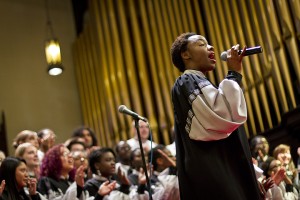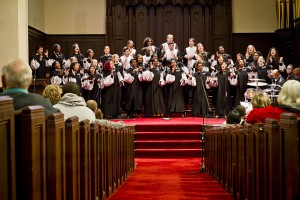Last Saturday April 16, Grinnell’s Young, Gifted, and Black Gospel Choir filled Herrick Chapel with sound. The singers clapped and swayed back and forth as they belted classics like “Ride on King Jesus” and “With God I Can.” The choir is lead by Barry Jones, Lecturer in Music, who also accompanied on the piano, and consists of forty-two students and two guest musicians, Jon McCutchen on drums and Byron Jones on bass.

The choir was dressed uniformly in black robes with flowing white sleeves, which accentuated their animated motion. The energy in the room was affecting, and throughout the concert audience members would stand up to join the sway. Others sat quietly, eyes closed, lost in the music.
The audience, like the choir, was comprised of many different creeds and colors and consisted of students, faculty and town-members. The singers are proud of their eclectic group.
“We are a family comprised of individuals from all over the world,” said member Michelle Okafor ’11. “We bring our culture, our different religious backgrounds and experiences together to form a choir. We are unified through diversity across all racial/ethnic, religious, and class statuses.”

Simon Kanter ’12, who attended the concert, joked that “to be part of the Young, Gifted, and Black Choir you only need to fulfill two of the three descriptions.” Indeed, the choir has open arms for all individuals. Barry Jones affirmed that anyone in the audience could show up for rehearsal.
“Everyone is welcome,” Jones said.
For the members of the choir, YGB is much like the family Okafor described. Halfway through the concert the singers cleared the stage in order to honor their 12 graduating seniors. For each senior, a lowerclassman presented a flower and a few words of praise and thanks.
The ceremony demonstrated the deep bonds within the choir. Although they only practice together once a week, the singers are devoted to helping each other overcome any struggle and are certainly there to celebrate life’s blessings.
“The energy is amazing! When the songs we sing speak into my situation, I feel a surge of chills and excitement overtake my body,” Okafor said.
Indeed, looking through the audience everyone was smiling, the uplifting songs of the choir melted away any stress or burden. Although this was their last concert of the year, their doors are always open for anyone who wants to sing.


































































Frank • May 2, 2011 at 7:36 pm
That non black students have had a place on YGB’s stage does not in anyway diminish my point. In fact, if you will reread my post, I clearly acknowledge that. The point remains however, and as reinforced by Jessica above that a white student could not be lead. Henxe there remain differentiated roles within the group. I will hesitate to appropriate encompassing terms to describe the composition of the group, yet doing so conveys the point. I couldn’t have stage fright since I’m an ‘amoral’ atheist and I dobt that I would have felt welcome anyway. I’m sure other music groups would have welcomed my inclusion despite my ‘questionable’ beliefs!
Jessica '09 • Apr 29, 2011 at 11:40 pm
The group sings in the African-American Gospel tradition. If you’re going to be offended about racial politics, rather than worrying about non-Black exclusion, I think I would be more disturbed about the cultural appropriation of an identity term (or several of them) that most definitely does not represent the composition of the group.
I’m a former white choir member, and I never felt an explicit sense of tension or exclusion because of my race but I was aware that I was stepping into a role that was neither part of my culture, nor my background and I tried to be respectful of this fact. I may not have been the first-choice lead, but for the benefit of the group I’m glad singers were chosen who had the experience necessary to pull it off, and for the most part, these singers are going to be African-American.
Michelle O. • Apr 29, 2011 at 1:38 am
@Rosie: Thank you!
@Frank: I hope you learned something.
Rosie Pérez • Apr 28, 2011 at 3:28 am
@Frank: I was in the Latin American Ensemble for the bulk of my time at Grinnell and despite its name (and the fact that about 99% of the songs we sang were not in English), people from pretty much EVERY cultural background have formed part of this group over the years. Why keep “Latin American” in the title? Not only to describe the category of music being performed, but the origin of such music. The fact is that YGB is a gospel music group, and gospel music is an undeniable feature of Black culture in the United States. Why you feel that this “sends a pretty clear signal as to who is welcome and who isn’t” remains a mystery to me, especially considering that non-Black students have had a place on YGB’s stage (just as non-Latin American students have shared the stage with the Latin American Ensemble). Are you merely suffering from a case of stage fright?
Frank • Apr 27, 2011 at 8:58 am
I think its pretty ridiculous that this group maintains a “unified” external posture while retaining its pretty exclusive name and constantly belting out songs that reflect an african american church experience. I’m pretty certain that there exist internal fissures and that some singers within the group feel marginalized. Why keep the ‘black’ in the name history or otherwise? I think that sends a pretty strong signal as to who is welcome and who isn’t. Additionally the group has an explicitly christian bent while pretending that ‘everyone’ is welcome. There is nothing wrong with having a young gifted black and christian group. Just don’t pretend that it is something else. I think that quite contrary to grinnell’s values of inclusion this group is only a pseudo inclusive one. To perpetuate the myth that it is all welcoming is disingenuous at best and insulting at worst.